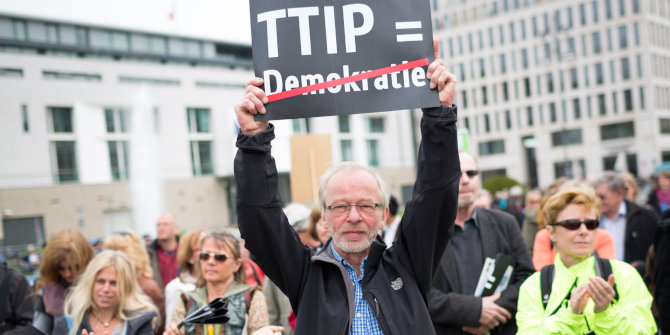 Coverage of EU budget negotiations typically focuses on the contributions of individual member states and the trade-offs required to secure an agreement. But as Firat Cengiz writes, EU budget decisions can also significantly affect structural inequalities facing EU citizens. There is a clear case for making the issue of gender equality a more visible part of the EU budgetary process – and it may fall on the European Parliament to put pressure on the other EU institutions to achieve this.
Coverage of EU budget negotiations typically focuses on the contributions of individual member states and the trade-offs required to secure an agreement. But as Firat Cengiz writes, EU budget decisions can also significantly affect structural inequalities facing EU citizens. There is a clear case for making the issue of gender equality a more visible part of the EU budgetary process – and it may fall on the European Parliament to put pressure on the other EU institutions to achieve this.
Budgets are not gender neutral. Women and men have different needs and expectations from public services. These needs and expectations also differ between individuals due to other intersecting qualities, such as race, social and economic class, refugee and migration status, sexual and gender identity and disability status. For instance, the type of public services needed by minority refugee women with a low income will be very different to those needed by white middle class men.
However, often distinct needs might have to compete against each other in the context of the allocation of limited public funds. If the diversity of citizens’ needs are not taken into consideration in the allocation of public funds, budgetary policies and decisions can exacerbate existing gender and other inequalities. This is why feminist economists have long argued that budgets are ‘gender-blind’ and that they need to be ‘gender sensitive’ or ‘gender responsive’ to contribute to gender equality or at least not to exacerbate existing gender inequalities. Feminist economists further argue that gender and other inequalities need to be taken into account in all budgetary processes: including budget-making, implementation and budgetary accountability.
When it comes to the EU budget, it is predominantly the contributions of individual member states to the budget that dominate the public discourse, rather than how the EU spends money. Every autumn when the budget negotiations for the following year begin, national media and politics shift their focus to what the individual member state in question contributes to the EU budget in comparison to what it gets from it vis-à-vis the other member states. Similarly, the outcomes of the budgetary process are predominantly determined by zero-sum negotiations that take place behind closed doors between the national governments rather than open political debate that takes place in the European Parliament. Individual member state contributions to the EU budget was also among the most grossly manipulated subjects in the public discourse preceding the Brexit referendum.
Since the EU does not operate a welfare state and since individual member states, rather than the EU, provide public services, the obsession with member state contributions rather than how EU spending affects citizens might seem natural. Nevertheless, although the EU does not operate a welfare state, EU spending can still significantly, and positively as well as negatively, affect structural inequalities facing EU citizens.
Firstly, the EU has made high-level legal and political commitments to respect and aim for equality in general and gender equality specifically in its policies and actions. This commitment is recognised, among others, in Articles 2 and 3 of the TEU, Article 8 of the TFEU and Article 23 of the EU Charter of Fundamental Rights. Secondly, most EU programmes and policies involve shared management, in which spending and investment take place at the national level in the light of conditions and criteria determined at the EU level. As a result, the spending of EU funds affects inequalities facing citizens either positively or negatively depending on whether and how the EU programme or policy in question takes into consideration its implications on equality.
The absence of gender equality in the EU budget
Notwithstanding the EU’s high-level commitments, gender and equality do not play any visible role in the budgetary process. European politics has become increasingly inhospitable at both the national and EU levels towards social policy goals and equality in general in the shadow of the prevailing neoliberal economic objectives and the post-2008 austerity discourse. There is overwhelming evidence that the neoliberal agenda and austerity politics hit women harder than men. Not only have a greater number of women working in the public sector lost their jobs as a result of austerity but women are more likely to be employed precariously on zero-hour or otherwise uncertain contracts. Additionally, women work several shifts to fill the care gaps left by austerity, as it is predominantly women who care for the children, sick, disabled and the elderly.
This inhospitable political environment is also reflected in tangible EU policy actions and documents: for instance, the European Commission replaced its previous gender equality strategy with a mere ‘strategic engagement document’ in 2016; the Juncker Commission’s ten priorities for 2015-19 do not refer to gender or equality at all; and the European Semester does not include any specific mechanisms to evaluate and mitigate the Economic and Monetary Union’s effects on equality in general and gender equality specifically.

Credit: © European Union PE-EP/Pietro Naj-Oleari (CC BY-NC-ND 2.0)
In 2015 I conducted an extensive study with Fiona Beveridge looking into the role of gender in the EU budgetary process and politics in the light of an original capabilities-based methodology. This study revealed the gender-blindness of EU budgetary politics and policies. The study concluded that in the absence of an overall commitment to gender budgeting, even those EU policies that aim to tackle gender related issues are likely to make little progress if at all. This is because societal issues affecting gender equality (such as poverty, gender-based violence, women’s access to education, politics and economy) are complex and multi-dimensional and they can only be addressed through consistent political action. As a result, the study called the three institutions involved in the EU budgetary process, namely the Council, the Commission and the Parliament, to make a joint commitment to address the gender-blindness of the EU budgetary process.
Since the publication of the study, the European Parliament’s Women’s Rights and Gender Equality Committee (FEMM) has called on all of the EU’s institutions to adopt a gender responsive approach to budgeting with increasing emphasis and urgency. Nevertheless, FEMM does not enjoy any formal power in the budgetary process, thus, its opinions are unlikely to translate into tangible results. Perhaps more importantly, however, the Parliament collectively adopted a resolution in 2017 calling for all EU institutions to honour the EU’s commitment to gender equality in the budgetary process. Following the lead of the Parliament, EIGE has produced a toolbox to assist the implementation of gender responsive budgeting in the EU.
Nevertheless, the Parliament’s call has not shifted the position of the other EU institutions that enjoy tangible powers in the budgetary process, namely the Commission and the Council. An update of the results of the 2015 study has found that little if any progress has been made in gender budgeting since 2015. Most notably, gender equality has not played any role in the mid-term review of the EU’s 2014-2020 Multiannual Financial Framework (MFF) that sets targets for long-term spending. Neither does gender equality play any role in the forthcoming 2021-2027 MFF. New Regulations that are being adopted to reform EU policies and funding programmes in preparation for the new MFF do not recognise gender equality as a horizontal policy objective even in policies with very obvious effects on gender equality, such as the Justice, Rights and Values Programme, European Social Fund+, European Global Adjustment Fund, Erasmus and Creative Europe.
The way forward? The European Parliament as a gender budgeting advocate
Countries and polities that show a strong commitment to gender equality in the budgetary process – from Austria where gender budgeting enjoys a constitutional status to Penang in Malaysia where an original participatory gender budgeting process is implemented – adopted gender budgeting not on its own but as part of a group of reforms that aim to accomplish political change and more democratic and accountable governance. As a result, it would be extremely unrealistic to expect a major shift in the EU’s approach to gender equality in the budgetary process in the absence of a shift in the underlying economic and political environment that is inhospitable towards equality.
If progress, however small, is to be made in incorporating a gender perspective in the budgetary process, the European Parliament as the institution representing citizen interests appears to be the natural advocate for this. Given the limited role of the Parliament in the budgetary process, which is still dominated by zero-sum negotiations between the member states despite budgetary reform, the Parliament will have to represent a unified position on gender in the budgetary process based on coalitions between its committees. It is, therefore, promising that the Parliament as an institution in unity adopted the 2017 Resolution on EU Funds for Gender Equality.
It is also promising to see the Budget Committee adopt a position on the role of gender mainstreaming in its own work, as this example shows that gender equality is no longer seen as a soft issue to be discussed exclusively by FEMM but instead penetrates the domain of other committees with tangible powers in the budget process. This is due to the hard work of a group of dedicated MEPs who have dual committee memberships and who voice gender related concerns systematically in the work of the committees other than FEMM.
On a less positive note, although the budgetary debates in the Plenary provide an invaluable opportunity to press the other EU institutions, and in particular the Commission, to adopt a gender sensitive approach to budgeting, MEPs are yet to seize this opportunity. Gender and equality are not even mentioned in the Plenary even when the debates centre on the particularly gendered issues of economic recovery and migration and security.
Please read our comments policy before commenting.
Note: This article gives the views of the author, not the position of EUROPP – European Politics and Policy or the London School of Economics.
_________________________________
 Firat Cengiz – University of Liverpool
Firat Cengiz – University of Liverpool
Firat Cengiz is a Senior Lecturer in Law and a Marie Curie Fellow at the University of Liverpool.



